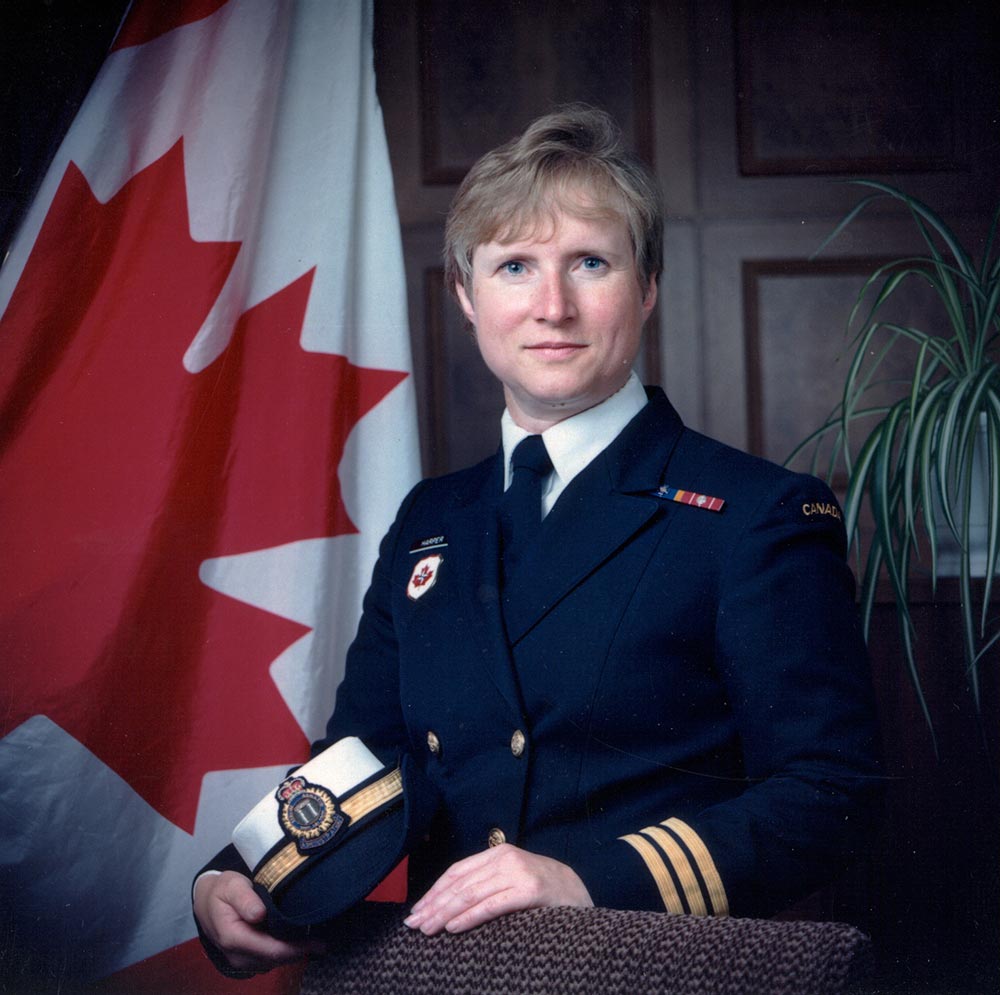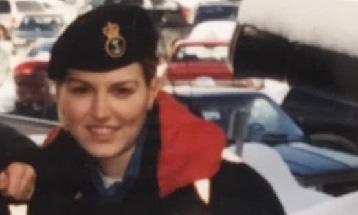Knew no boundaries
Throughout her military career, Judy Harper had always been the first woman in her role, either as an operational commander or in senior positions in National Defence Headquarters.
“As a child, I never knew how limited options were for women,” she says—in the military or in general. Perhaps that is why she led the way for many women to advance to senior roles in the Canadian Armed Forces (CAF).
Queen’s Harbour Master Judith on the waterfront in Halifax, 1974.
Both of Judy’s parents served in the Royal Canadian Navy during and after the Second World War. “My mom joined in 1942, right after the Navy opened to women,” she says. Mrs. Harper, who had had a career in banking, served as a pay clerk through the war.
Her father served as an engineering officer from 1939 to 1968. “When I was a girl, he used to take me onto his ship from time to time,” Judy recalls.
Judy joined the Navy Reserve in 1970. After training in Shearwater, Nova Scotia, she was posted to Halifax in the helicopter squadron. She served as a Quartermaster, Duty Officer and in other important roles. “There were a lot of lateral moves in the Navy,” she remembers.
Due to the unification of the three Canadian armed services into a single command, Judy Harper gained the rank of Captain. Her commanding officer saw the barriers and obstacles to women at the time and arranged for her to be posted as an assistant to the Assistant Deputy Minister of Defence in 1975 to gain more experience.
Thus began Judy’s blazing of a new path for women in the CAF. “There were no other female senior officers in headquarters” in 1975, she says. By 1980, there were six.
Making history
Judy was the first woman to be accepted into the Military Master’s Degree Program, and went to Carleton University from 1977 to 1978 to study Public Administration. In 1980, she was promoted to Major, having been selected out of a mostly-male applicant pool.

Judith Harper on a staff assistance visit to the Canadian Logistics unit serving in the Golan Heights in 1990.
Judy went on to gain experience at senior command with a series of postings. “Women in command positions was still a new thing in the 80s,” Judy says. Fortunately, her experience was generally positive. “The men I dealt with then did not see women as a threat.”
In 1987, Judy was promoted to Lieutenant-Colonel and worked on the CREW program: Combat-Related Employment of Women, which studied the impact of employing men and women in combat units. As part of that, she worked with recruiters on attracting more women to join the CAF.

Judith Harper 1998 reviews a parade of the Canadian Forces Support Unit (Ottawa) and those who worked for her in 1998.
In 1991, Lt.-Colonel Harper was awarded the Order of Military Merit (OMM). Soon after, she was posted to Lahr, Germany as base administration officer, where her role was to support CAF members’ families.
When that base closed in 1993, then Chief of Defence Staff John Anderson invited Lt.-Colonel Harper to command the Canadian Forces School of Administration and Logistics in Borden, Ontario. “It was an exciting time for me,” she says.
By 1996, the separate service rank designations had been restored. So when Judy was promoted and posted to a support unit in Ottawa, her new rank was Captain (Navy). Later, she was transferred to human resources, in charge of education and training, “another job that no woman had done before,” she recalls.
Transition
In 2005, after a 35-year career, Captain (Navy) Judy Harper retired, transitioning to her post-military life. But that did not mean she stopped blazing new trails.

Captain (Navy) (Retired) Judith Harper in Ottawa in 2021.
“I already owned a home in Ottawa, so I settled down here.” Unable to be idle, Judy joined Canadian Women Golfers Inc. and began giving golf lessons.
That wasn’t enough, though. “I had always wanted to sew quilts,” she says, and joined Victoria’s Quilts Canada. A network of 22 quilting groups across Canada, members collaborate to make quilts for cancer patients. She plays a key role in directing the network’s efforts. “I sit down at my computer at six every morning, review requests for quilts, assign them to the right group of quilters and ensure the orders are fulfilled.” Judy also sews quilts herself. “It takes about three months to make a quilt. I once sewed a quilt by hand. It took me three years. Never again!”
Judy is also a Governor with the Corps of Commissionaires of Canada, which employs thousands of Veterans across Canada working in security services. In addition, Judy sits on the Board of Directors of her condominium corporation, helping ensure the building is a safe, supportive environment for all residents.
Not slowing down
Not even the COVID pandemic has slowed Judy down. She has continued her many activities, both virtually and in-person where masks and physical distancing make it possible.
As for the future? Judy says: “My ambition now is to be able to meet people in person again.”
Who knows? Judy may even take up yet another new activity.




